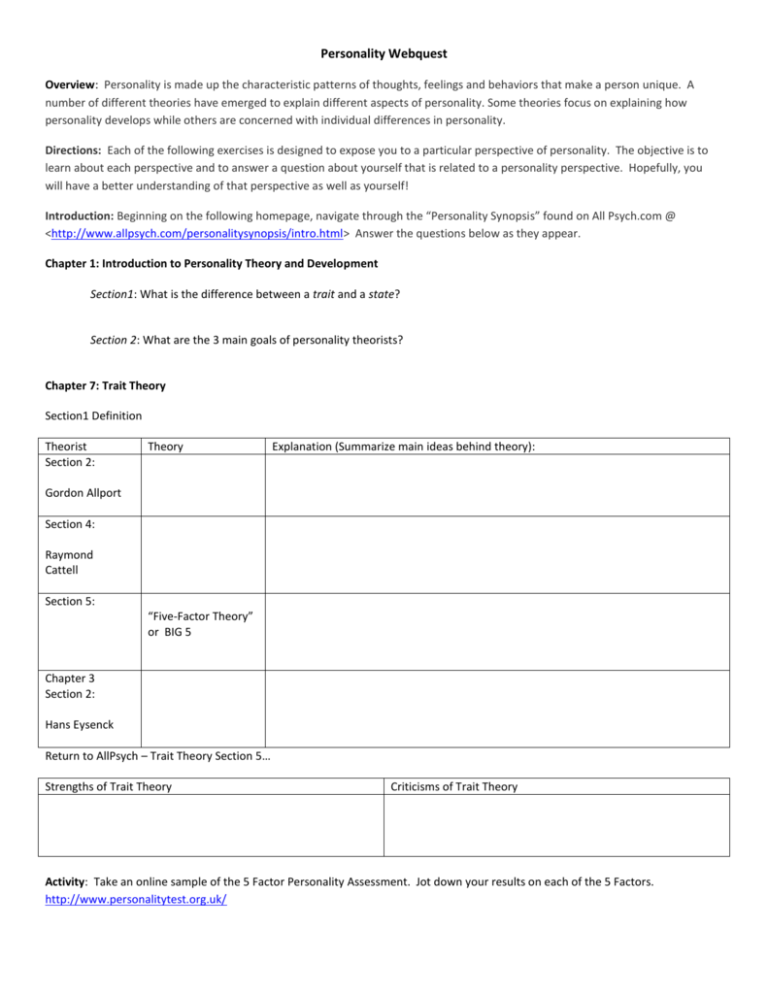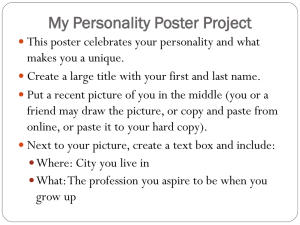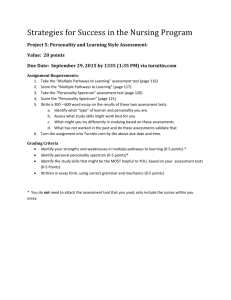Personality Webquest Overview: Personality is made up the
advertisement

Personality Webquest Overview: Personality is made up the characteristic patterns of thoughts, feelings and behaviors that make a person unique. A number of different theories have emerged to explain different aspects of personality. Some theories focus on explaining how personality develops while others are concerned with individual differences in personality. Directions: Each of the following exercises is designed to expose you to a particular perspective of personality. The objective is to learn about each perspective and to answer a question about yourself that is related to a personality perspective. Hopefully, you will have a better understanding of that perspective as well as yourself! Introduction: Beginning on the following homepage, navigate through the “Personality Synopsis” found on All Psych.com @ <http://www.allpsych.com/personalitysynopsis/intro.html> Answer the questions below as they appear. Chapter 1: Introduction to Personality Theory and Development Section1: What is the difference between a trait and a state? Section 2: What are the 3 main goals of personality theorists? Chapter 7: Trait Theory Section1 Definition Theorist Section 2: Theory Explanation (Summarize main ideas behind theory): Gordon Allport Section 4: Raymond Cattell Section 5: “Five-Factor Theory” or BIG 5 Chapter 3 Section 2: Hans Eysenck Return to AllPsych – Trait Theory Section 5… Strengths of Trait Theory Criticisms of Trait Theory Activity: Take an online sample of the 5 Factor Personality Assessment. Jot down your results on each of the 5 Factors. http://www.personalitytest.org.uk/ Chapter 4: Psychoanalytic Theory Section1 : Read a little bit about Freud’s interesting upbringing. Many believe it is strongly reflected in his theory. Freud’s Theory of Personality has 5 parts. We will look at this theory in more detail during class, but read the following sections for background. Answer the questions below. Section 2: Explain the 2 basic human drives. Section 2: When and how do the 3 parts of the human personality develop? IdEgoSuperego- Section 2: Describe Freud’s concept of the mind. ConsciousPreconsciousUnconscious- Section 3: Psychosexual Theory - Explain how erogenous zones and fixations influence our adult personality. Section 4: What are defense mechanisms? Jeepers, that’s a lot to process! But hold on…here’s just a bit more… Activity: Visit <http://www.makingthemodernworld.org.uk/learning_modules/psychology/02.TU.04/?section=13> and complete the activities related to Freudian Techniques of Psychoanalysis! What are some of the techniques? What are your impressions of the techniques? How could or why would they be used? Chapter 8: Behavioral and Social Learning Theory Behaviorist approaches are different from most other perspectives because they view people as controlled by their environment and specifically that we are the result of what we have learned from our environment. Most early contributors to learning theory weren’t even researching personality! Sections 1 & 2: Who were some of these early researchers? Sections 4 & 5: What’s the difference between social learning theory and social-cognitive theory? Activity: Identify some of the behaviors or personality traits you’d like to learn to change. Chapter 10: Humanistic Theory This perspective offers a very positive viewpoint of human nature and potential. Emphasizing the personal worth of each individual, this perspective suggests that we are each responsible for our own happiness and well-being as humans. We have the innate capacity for self-actualization which is our unique desire to achieve our highest potential as people. Section 1: When and why did this perspective develop? Theorist Section 2: Theory Explanation (Summarize main ideas behind theory): Abraham Maslow Section 3: Carl Rogers Chapter 11: Cognitive Theory Section1: How does thought influence personality? Theorist Section 2: Theory Explanation (Summarize main ideas behind theory): George Kelly Section 4: Albert Ellis Conclusion Read Chapter 12 Section 4. Summarize what you’ve learned about personality psychology. What would you like to learn more about?









